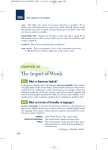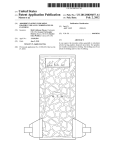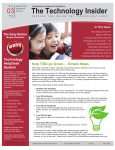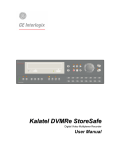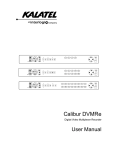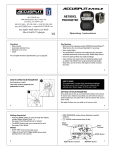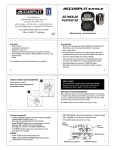Download 21f SPELLING
Transcript
TROYMC10_29_0131889567.QXD 21b 1/27/06 7:41 PM Page 256 SPELLING NO In reference to the above captioned, you can include a page that additionally contains an Include instruction under the herein stated circumstances. The page including the Include instruction is included when you paginate the document, but the included text referred to in its Include instruction is not included. [This message is meaningless, but the writer seems to understand the message. Anyone who doesn’t is clearly uninformed or unable to read intelligently.] —From instructions for compiling a user’s manual In response to earlier editions of this handbook, we’ve been asked to give a YES alternative for this example. We regret that we can’t understand enough of the NO example to do that. If you, gentle reader, can, please contact us at <[email protected]>. CHAPTER 21 Spelling 21a What makes a good speller? You might be surprised to hear that good spellers don’t know how to spell and hyphenate every word they write. What they do know, however, is to check if they’re not sure of a word’s spelling. If your inner voice questions a spelling, do what good spellers do—consult a dictionary. A L E R T: Word processing software usually includes a spell-check program, which claims to spot spelling errors because the words typed in don’t match the spellings in the software’s dictionary. Such programs have one major drawback. The programs can’t detect that you’ve spelled a wrong word if what you’ve typed is a legitimate spelling of a legitimate word. For example, if you mean top but type too, or if you mean from and type form, no spell-check program “sees” a mistake. In these and other similar cases, only the human eye (that is, a reader) can discover the errors. 21b How can I proofread for errors in spelling and hyphen use? Many spelling errors are the result of illegible handwriting, slips of the pen, or typographical mistakes. Catching these “typos” requires especially careful proofreading, using the techniques in Box 21-1. 256 TROYMC10_29_0131889567.QXD 1/27/06 6:30 PM Page 257 How are plurals spelled? B OX 2 1 - 1 21c S U M M A RY Proofreading for errors in spelling ■ ■ ■ ■ Slow down your reading speed to allow yourself to concentrate on the individual letters of words rather than on the meaning of the words. Stay within your “visual span,” the number of letters you can identify with a single glance (for most people, about six letters). Put a ruler or large index card under each line as you proofread, to focus your vision and concentration. Onscreen, highlight a small area. Read each paragraph in reverse, from the last sentence to the first. This method can keep you from being distracted by the meaning of the material. 21c How are plurals spelled? In American English, plurals take many forms. The most common form adds an s or es at the end of the word. The list below covers all variations of creating plurals. ■ Adding -s or -es: Plurals of most words are formed by adding an s, including words that end in “hard” -ch (sounding like k): leg, legs; shoe, shoes; stomach, stomachs. Words ending in -s, -sh, -x, -z, or “soft” -ch (as in beach) are formed by adding -es to the singular: lens, lenses; tax, taxes; beach, beaches. ■ Words ending in -o: Add -s if the -o is preceded by a vowel: radio, radios; cameo, cameos. Add -es if the -o is preceded by a consonant: potato, potatoes. With a few words, you can choose the -s or -es plural form, but current practice generally supports adding -es: cargo, cargoes; tornado, tornadoes; zero, zeros or zeroes. ■ Words ending in -f or -fe: Some final f and fe words are made plural by adding an s: belief, beliefs. Others require changing -f or -fe to -ves: life, lives; leaf, leaves. Words ending in -ff or -ffe simply add -s: staff, staffs; giraffe, giraffes. ■ Compound words: For most compound words, add an s or es at the end of the last word: checkbooks, player-coaches. In a few cases, the first word is made plural: sister-in-law, sisters-in-law; miles per hour. (For information about hyphens in compound words, see 21g.) ■ Internal changes and endings other than -s: A few words change internally or add endings other than an s to become plural: foot, feet; man, men; crisis, crises; child, children. 257 TROYMC10_29_0131889567.QXD 21d 1/27/06 6:30 PM Page 258 SPELLING ■ Foreign words: The best advice is to check your dictionary. In general, many Latin words ending in -um form the plural by changing -um to -a: curriculum, curricula; datum, data; medium, media. Also, Latin words that end in -us usually form the plural by changing -us to -i: alumnus, alumni; syllabus, syllabi. Additionally, Greek words that end in -on usually form the plural by changing -on to -a: criterion, criteria; phenomenon, phenomena. ■ One-form words: Some words have the same form in both the singular and the plural: deer, elk, fish. You need to use modifiers, as necessary, to indicate which form you mean: one deer, nine deer. EXERCISE 21-1 Write the correct plural form of these words. For help, con- sult 21c. 1. 2. 3. 4. 5. yourself sheep photo woman appendix 6. 7. 8. 9. 10. millennium lamp runner-up criterion lunch 11. 12. 13. 14. 15. echo syllabus wife get-together crisis 21d How are suffixes spelled? A suffix is an ending added to a word that changes the word’s meaning or its grammatical function. For example, adding the suffix -able to the VERB depend creates the ADJECTIVE dependable. 258 ■ -y words: If the letter before a final y is a consonant, change the y to i and add the suffix: try, tries, tried. In the case of trying and similar words, the following rule applies: Keep the y when the suffix begins with i (apply, applying). If the letter before the final y is a vowel, keep the final y: employ, employed, employing. These rules don’t apply to IRREGULAR VERBS (see Box 8-4 in section 8d). ■ -e words: Drop a final e when the suffix begins with a vowel, unless doing this would cause confusion: for example, be + ing can’t be written bing, but require does become requiring; like does become liking. Keep the final e when the suffix begins with a consonant: require, requirement; like, likely. Exceptions include argue, argument; judge, judgment; true, truly. ■ Words that double a final letter: If the final letter is a consonant, double it only if it passes three tests: (1) its last two letters are a vowel followed by a consonant; (2) it has one syllable or is accented on the last syllable; (3) the suffix begins with a vowel: drop, dropped; begin, beginning; forget, forgettable. ■ -cede, -ceed, -sede words: Only one word in the English language ends in -sede: supersede. Only three words end in -ceed: exceed, proceed, succeed. All other words with endings that sound like “seed” end in -cede: concede, intercede, precede. TROYMC10_29_0131889567.QXD 1/27/06 6:30 PM Page 259 How are homonyms and other frequently confused words spelled? 21f ■ -ally and -ly words: The suffixes -ally and -ly turn words into adverbs. For words ending in -ic, add -ally: logically, statistically. Otherwise, add -ly: quickly, sharply. ■ -ance, -ence, and -ible, -able: No consistent rules govern words with these suffixes. When in doubt, look up the word. 21e What is the ie , ei rule? The famous rhymed rule for using ie and ei is usually true: I before e [believe, field, grief], Except after c [ceiling, conceit], Or when sounded like “ay”_____ As in neighbor and weigh [eight, vein]. There are major exceptions (sorry!) to the ie, ei rule, listed here. My best advice is that you memorize them. ■ ie: conscience, financier, science, species ■ ei: either, neither, leisure, seize, counterfeit, foreign, forfeit, sleight (as in sleight of hand), weird E X E R C I S E 2 1 - 2 Follow the directions for each group of words. For help, consult 21d and 21e. 1. Add -able or -ible: (a) profit; (b) reproduce; (c) control; (d) coerce; (e) recognize. 2. Add -ance or -ence: (a) luxuri_____; (b) prud_____; (c) devi_____; (d) resist_____; (e) independ_____. 3. Drop the final e as needed: (a) true + ly; (b) joke + ing; (c) fortunate + ly; (d) appease + ing; (e) appease + ment. 4. Change the final y to i as needed: (a) happy + ness; (b) pry + ed; (c) pry + ing; (d) dry + ly; (e) beautify + ing. 5. Double the final consonant as needed: (a) commit + ed; (b) commit + ment; (c) drop + ed; (d) occur + ed; (e) regret + ful. 6. Insert ie or ei correctly: (a) rel_____f; (b) ach_____ve; (c) w_____rd; (d) n_____ce; (e) dec_____ve. 21f How are homonyms and other frequently confused words spelled? Homonyms are words that sound exactly like other words: to, too, two; no, know. The different spellings of homonyms tend to confuse many writers. The same holds for words that sound almost alike (accept, except; conscience, conscious). 259 TROYMC10_29_0131889567.QXD 21f 1/27/06 6:30 PM Page 260 SPELLING Another reason for spelling problems is so-called swallowed pronunciation, which means one or more letters at the end of a word aren’t pronounced clearly. For example, the -d ending in used to or prejudiced or the -ten ending in written are often swallowed rather than pronounced. When writers spell as they mispronounce, spelling errors result. For more information about word usage that affects spelling, see Chapter 19, “Usage Glossary.” Box 21-2 lists homonyms and other words that can be confused and lead to misspellings. B OX 2 1 - 2 S U M M A RY Homonyms and other frequently confused words ■ ACCEPT EXCEPT ■ ADVICE ADVISE ■ AFFECT EFFECT ■ ALLUSION ILLUSION ■ ALREADY ALL READY ■ ALTOGETHER ALL TOGETHER ■ ASCENT ASSENT ■ BREATH BREATHE ■ CAPITAL CAPITOL ■ CHOOSE CHOSE ■ CITE SIGHT SITE ■ COARSE COURSE 260 to receive with the exclusion of recommendation to recommend to influence [verb]; emotion [noun] result [noun]; to bring about or cause [verb] indirect reference false idea, misleading appearance by this time fully prepared thoroughly everyone or everything in one place the act of rising or climbing consent [noun]; to consent [verb] air taken in to take in air major city; money government building to pick PAST TENSE of choose to point out vision a place rough path; series of lectures ➞ TROYMC10_29_0131889567.QXD 1/27/06 6:30 PM Page 261 How are homonyms and other frequently confused words spelled? 21f Homonyms and other frequently confused words (continued) ■ COMPLEMENT COMPLIMENT ■ CONSCIENCE CONSCIOUS ■ COUNCIL COUNSEL ■ DAIRY DIARY ■ DESERT DESSERT ■ DIE something that completes praise, flattery sense of morality awake, aware governing body advice [noun]; to advise [verb] place associated with milk production personal journal to abandon [verb]; dry, usually sandy area [noun] final, sweet course in a meal to lose life (dying) [verb]; one of a pair of dice [noun] DYE ■ ELICIT ILLICIT ■ EMINENT IMMANENT IMMINENT ■ FAIR FARE ■ FORTH FOURTH ■ GORILLA GUERRILLA ■ HOLE WHOLE ■ INSURE ENSURE ■ ITS IT’S ■ LEAD LED ■ LIGHTNING LIGHTENING to change the color of something (dyeing) to draw out illegal prominent living within; inherent about to happen light-skinned; just, honest money for transportation; food forward number four in a series animal in ape family soldier conducting surprise attacks opening complete; an entire thing buy or give insurance guarantee, protect POSSESSIVE form of it CONTRACTION for it is heavy metal substance [noun]; to guide [verb] past tense of lead storm-related electricity making lighter ➞ 261 TROYMC10_29_0131889567.QXD 21f 1/27/06 6:30 PM Page 262 SPELLING Homonyms and other frequently confused words (continued) ■ LOOSE LOSE ■ MAYBE MAY BE ■ MINER MINOR ■ MORAL MORALE ■ OF OFF ■ PASSED PAST ■ PATIENCE PATIENTS ■ PRECEDE PROCEED ■ PRESENCE PRESENTS ■ PRINCIPAL PRINCIPLE ■ QUIET QUITE ■ RIGHT RITE WRITE ■ SCENE SEEN ■ SENSE SINCE ■ STATIONARY STATIONERY ■ THAN THEN 262 unbound, not tightly fastened to misplace perhaps [adverb] might be [verb] a person who works in a mine underage; less important distinguishing right from wrong; the lesson of a fable, story, or event attitude or outlook, usually of a group PREPOSITION indicating origin away from; not on past tense of pass at a previous time forbearance people under medical care to come before to continue being at hand; attendance at a place or in something gifts foremost [ADJECTIVE]; school head [noun] moral conviction, basic truth silent, calm very correct; opposite of left ritual to put words on paper place of an action; segment of a play viewed perception, understanding measurement of past time; because standing still writing paper in comparison with; besides at that time; next; therefore ➞ TROYMC10_29_0131889567.QXD 1/27/06 6:30 PM Page 263 What are compound words? 21g Homonyms and other frequently confused words (continued) ■ THEIR THERE THEY’RE ■ TO TOO TWO ■ WAIST WASTE possessive form of they in that place contraction of they are toward also; indicates degree (too much) number following one midsection of the body discarded material [noun]; to squander, to fail to use up [verb] ■ WEATHER WHETHER ■ WHERE WERE ■ WHOSE WHO’S ■ YOUR YOU’RE YORE climatic condition if, when alternatives are expressed or implied in which place past tense of be possessive form of who contraction for who is possessive form of you contraction for you are long past 21g What are compound words? A compound word puts together two or more words to express one concept. Open compound words remain as separate words, such as decision making, problem solving, and editor in chief. Hyphenated compound words use a hyphen between the words, such as trade-in, fuel-efficient, and tax-sheltered. For punctuation advice about hyphens, see 28i. Closed compound words appear as one word, such as proofread, citywide, and workweek. The history of compound terms that end up as single words usually starts with the compound as two words, and then moves to a hyphenated compound. To check whether a compound term consists of closed, hyphenated, or open words, consult an up-to-date dictionary. 263









